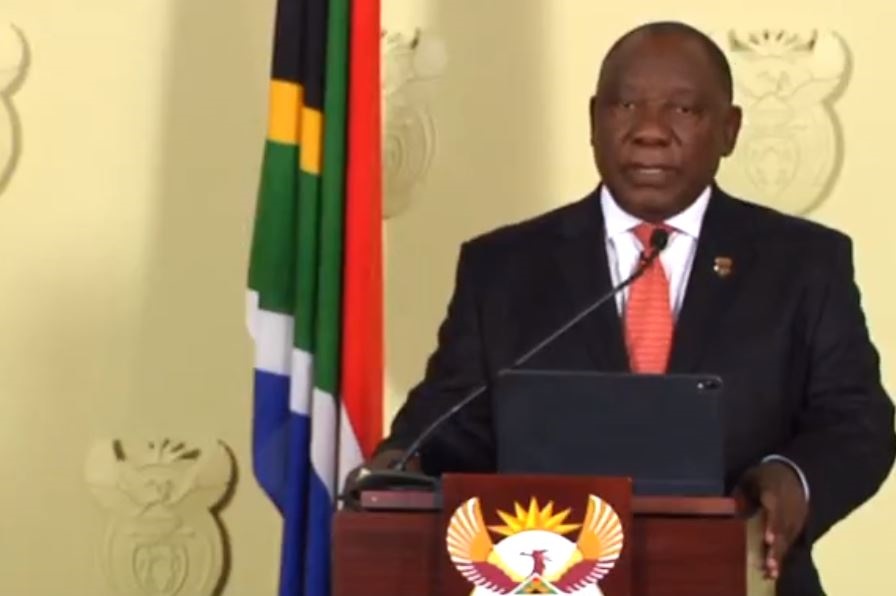
On Monday night President Cyril Ramaphosa became a wartime president. And he showed South Africans that the only way home is to unite around a single purpose, and that is to defeat the Covid-19 disease, writes Pieter du Toit.
On the day before the Allies launched D-Day, the greatest military operation the world had ever seen, General George Patton, a foul-mouthed and self-absorbed American commander, addressed his troops in the south of England.
Everyone was afraid of what was to come, scared of the unknown and uncertain how events would unfold. But all of the troops in Patton's Third Army, about to head to Omaha beach on the Normandy coast, knew that the operation was to be the single most important turning point of the Second World War, and that victory or defeat hinged on their actions over the next 24 to 48 hours.
READ: Ramaphosa announces raft of 'quick, targeted' interventions to buoy SA economy
"Sure, you want to go home. We want this thing over with," he told his men. "But you can't win a war lying down. The quickest way to get over it is to get the bastards. The quicker they are whipped, the quicker we go home. The shortest way home is through Berlin! We will win this war, but we will win it only by fighting and showing guts," Patton said.
On Monday night President Cyril Ramaphosa became a wartime president. And he showed South Africans that the only way home is to unite around a single purpose, and that is to defeat the Covid-19 disease.
Ramaphosa's war isn't against fascism or apartheid, or even unemployment and inequality. It's against a virus that has, as of last night, infected every major nation on the globe, caused enormous damage to the global economy, has seen more than 332 000 people being infected and caused more than 14 500 deaths.
It is a global crisis, and one which has exposed many world leaders – including those of the most advanced democracies and economies in the world – as inept, ill-informed, sluggish and incompetent.
In South Africa the infection curve has started to steepen. In the last 24 hours the number of infections has shot up from 274 to 402 cases, a jump of almost 47% in one day.
It is expected that the velocity of South African infections will only increase, and that only an extraordinary national effort will be able to prevent a full-scale national catastrophe.
Ramaphosa has recognised the scale of the challenge this country faces and has acted with clarity, calm and determination. He has addressed the country twice in eight days, twice delivering a statement with gravitas and empathy, girded by the reality of our situation and clear plans how government intends to respond.
It has been a couple of weeks since he has taken the active lead on his government's response. First, he took time to understand the warnings that a world-class team of scientists, doctors, virologists and epidemiologists at the National Institute of Communicable Diseases issued. He then worked with a core group of ministers to formulate an initial response before he set out to build broad consensus among politicians, religious leaders and captains of industry on the way forward.
Ramaphosa's leadership over the last two weeks has set him apart from most statesmen (and women), many of whom only acted after it was too late.
He has benefitted from other countries' missteps and neglect because he could learn from it, yes, but he has also been able to recognise the moment and base his decisions on scientific analyses and broad support.
Very few world leaders have been able to do that.
In his address Ramaphosa took ownership of his government's response, moving away from the ANC government's tradition of talking of a collective, often prefacing major decisions with the plural "we". On Monday night Ramaphosa said "I am concerned…" and proceeded to explain exactly what he, the elected head of state, was worried about.
He thanked South Africans for their support, he gave context to the deepening crisis and he spoke in emotive and loaded language, impressing upon everyone that "urgent", "dramatic" and "extraordinary" action is needed.
Where the debate on whether or not to enforce a lock-down in other countries is between how to save human lives while balancing the needs of the economy, Ramaphosa laid that to rest and said "the wellbeing of our people" is paramount in every decision his government will make. But he also announced a range of economic interventions – thrashed out with business leaders – which seek to mitigate the damage Covid-19 will undoubtedly cause.
Ramaphosa's address will rank as one of the most consequential by any democratic head of state, and one of the most historic of any South African government leader. It set the tone for a national effort which every citizen will feel compelled to heed.
Patton, all bluster and bravado, but much loved by his men, led his army to a series of bloody victories against the Germans en route to Berlin. Ramaphosa, an altogether different character who prefers to build consensus before acting, is about to embark on his own march to Berlin. His will also be a messy war.
He – and South Africa – cannot afford defeat.




 Publications
Publications
 Partners
Partners






















